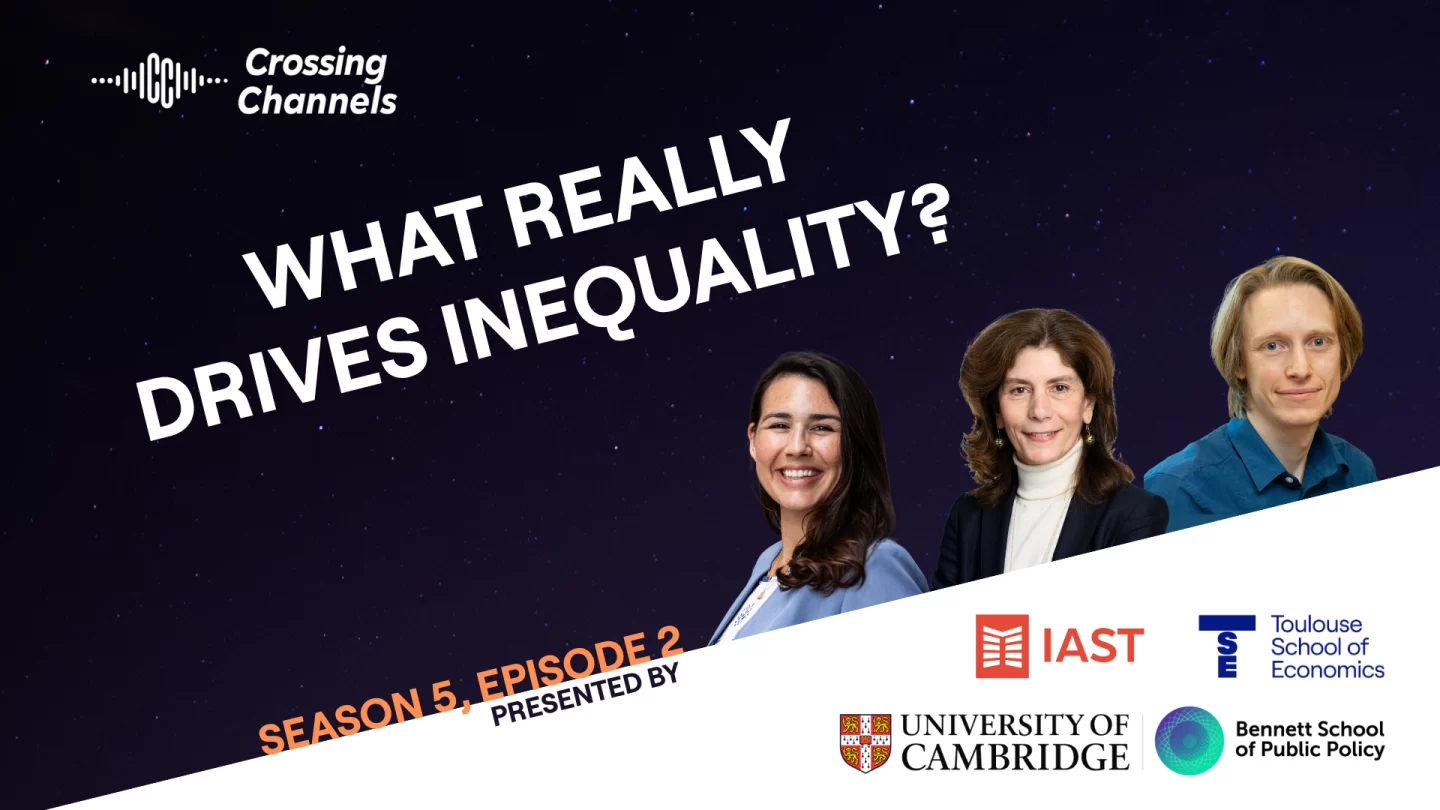Richard Westcott chats with Jack Newman, Angélique Acquatella and Pinelopi Koujianou Goldberg about what really drives inequality — from technology and trade to health and local policy — and how institutions can bridge the gap between national goals and everyday realities.

In this podcast episode of Crossing Channels, Richard Westcott talks to Jack Newman, Angélique Acquatella and Pinelopi Koujianou Goldberg about the forces that shape inequality today.
Drawing on economics, politics and public policy, our guests examine why gaps persist, look at the roles of technology and trade, explore evidence on health inequalities in the UK, and discuss the delivery gap between national ambitions and local capacity. They share examples of when place-based approaches can work, what gets in the way, and how institutions can support more inclusive growth.
Season 5 Episode 2 transcript: MS Word / PDF
Listen to this episode on your preferred podcast platform:
For more information about the Crossing Channels podcast series and the work of the Bennett School of Public Policy and IAST visit our websites at https://www.bennettschool.cam.ac.uk/ and https://www.iast.fr/.
With thanks to:
- Audio production by Alice Whaley
- Associate production by Burcu Sevde Selvi
- Visuals by Tiffany Naylor and Pauline Alves
More information about our podcast host and guests:
Podcast host
Richard Westcott is an award-winning journalist who spent 27 years at the BBC as a correspondent/producer/presenter covering global stories for the flagship Six and Ten o’clock TV news as well as the Today programme. Last year, Richard left the corporation and he is now the communications director for Cambridge University Health Partners and the Cambridge Biomedical Campus, both organisations that are working to support life sciences and healthcare across the city.
Podcast guests
Angélique Acquatella is an Assistant Professor at the Toulouse School of Economics. She received her PhD in Economics at Harvard University. During her doctoral studies, she was an NBER Aging and Health Fellow and a National Science Foundation Fellow. Angélique’sresearch looks at the optimal design of healthcare policy, within two main substantive areas: public health insurance systems and pharmaceutical payment policy. She is interested in policy designs that advance health equity, minimise risk for the most disadvantaged individuals, and incentivise socially valuable investments.
Jack Newman is a public policy researcher specialising in decentralisation and place-based policy. He is an Affiliated Researcher at the Bennett School of Public Policy, and a Research Associate at the University of Manchester, investigating the changing spatial footprint and governance structures of the NHS. In recent years, Jack has researched spatial inequality, local institutions, and healthy urban development at the Universities of Bristol, Cambridge, Manchester, Surrey, and Leeds.
Pinelopi (Penny) Koujianou Goldberg is the Elihu Professor of Economics and Global Affairs and an Affiliate of the Economic Growth Center at Yale University. She holds a joint appointment at the Yale Department of Economics and the Jackson School of Global Affairs. She is a member of the National Academy of Sciences and the American Academy of Arts and Sciences, recipient of Guggenheim Memorial Foundation and Sloan Research Fellowships, and recipient of the Bodossaki Prize in Social Sciences. Pinelopi is an applied microeconomist drawn to policy-relevant questions in trade and development.
The views and opinions expressed in this post are those of the author(s) and not necessarily those of the Bennett Institute for Public Policy.









